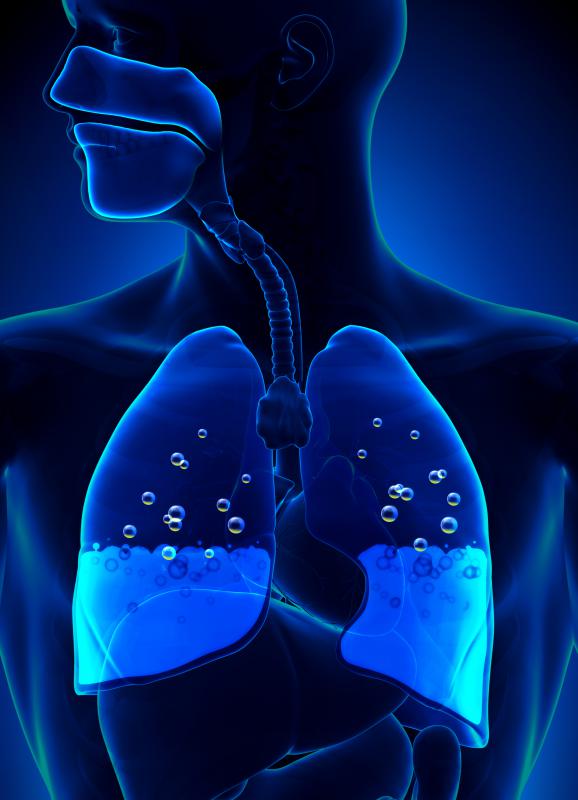At WiseGEEK, we're committed to delivering accurate, trustworthy information. Our expert-authored content is rigorously fact-checked and sourced from credible authorities. Discover how we uphold the highest standards in providing you with reliable knowledge.
What are Common Complications of Pneumonia?
The most common complications of pneumonia are infection of the lungs, sepsis, trouble breathing, internal abscess, and fluid buildup in the area between the lungs and the chest wall. The severity of these complications and the overall impact they have will depend on the health and age of the patient and whether or not additional health issues are present. Occasionally pneumonia can lead to severe infection and even death if not treated immediately.
Complications of pneumonia are more likely to occur in the elderly and in those with other health conditions such as emphysema or lung cancer. Certain heart conditions may make recovery from certain complications more complex as well. These individuals may have a longer recovery time than those who are young and in relatively good health.

Most of the time, complications of pneumonia involve infection of some sort. This generally occurs in the lungs themselves at first, but sometimes bacteria can spread throughout the body and infect the blood and other organ systems. This can cause serious problems if not treated promptly. Signs of infection may include pain, fever, nausea, dizziness, and vomiting. Infection that occurs solely in the lungs may also cause issues with breathing.

Many patients with pneumonia will experience excessive fluid buildup in the area between the lungs and the chest cavity. If this occurs in both lungs, breathing may become very difficult and almost impossible without intervention. Patients may be put on a ventilator to aid with breathing until the fluid can be cleared. Infection is most likely to occur if excessive fluid is present in both lungs.

Additional complications of pneumonia include abscesses on the lungs and heart failure in those with an underlying heart condition. An abscess is a pus-filled wound which grows and eventually bursts. They are generally drained by using a catheter which is inserted directly into the growth. This is a delicate procedure when the abscess occurs on a lung because the lungs are fragile and are prone to collapse if not handled carefully.

Sometimes pneumonia can lead to a strain on the heart because the body cannot get enough oxygen due to impaired breathing. This is generally most likely in those with underlying heart conditions or long-term breathing problems due to an additional lung illness. Special care must be taken for patients who are thought to have an underlying heart or lung condition, since they are most susceptible to severe complications of pneumonia.
AS FEATURED ON:
AS FEATURED ON:














Discussion Comments
My doctor said that pneumonia needs to be treated right away because if the bacteria isn't eliminated, they will grow in numbers in the lungs, cause an infection and even abscesses like the article said. So it's important to diagnose it quickly and take antibiotics.
@bluedolphin-- What about hypoxia? When the lungs don't work as well as they need to, another complication could be reduced oxygen delivery to tissues and cells. In fact, one of the major symptoms of pneumonia in children is a bluish tint of the lips which shows that the tissues aren't getting enough oxygen. Respiratory failure is probably not a common complication as you said but lack of oxygen in cells is definitely very common in pneumonia. That's why it is often necessary in advanced stages to stay at a hospital and receive oxygen therapy.
Respiratory failure is another very serious complication of pneumonia. My great aunt passed away because of it. I think what happens is that the fluid build-up, infection and inflammation makes breathing more and more difficult. The lungs aren't able to function properly. Of course, this is a severe complication and I don't think it happens unless there are many risk factors like age, weak immune system and other chronic health conditions.
My great aunt was almost ninety and she had many other issues including hearth problems when she passed away from pneumonia caused respiratory failure. So I don't think that most people who have pneumonia should worry about this.
Post your comments